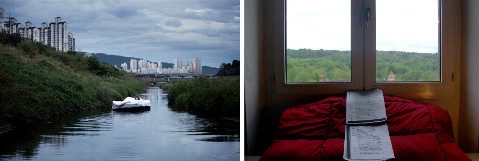- Venue
Stuart Hall Library
-
Time
6.30-8pm. Library opening hours: 10am-1pm and 2pm-5pm, Tuesday-Friday
-
Admission
Free, booking required
- Artists
The meeting will be convened by Dr.Christine Checinska, the 2nd Stuart Hall Library Animateur.
Dr Taey Iohe is an artist and writer based in London, Seoul and Dublin. Her art work engages with socio-cultural memories through language, installation and moving images, and introduces the concept of the translating space. She has received her PhD at the School of English, Drama and Film at University College Dublin (2014); her research suggests a creative way of understanding migratory aesthetics, and builds an imaginary architecture to bring together the critical concepts and the practical tools of the artist in her art making.
Taey Iohe will present on ‘Sleep, Space and Motion’.
Her recent works include a series of photographic, performance and art writing pieces, which focus on the event of sleep. Flux of Sleepings is a photographic series, video installation and performance project about the spatiality of sleep; in these works she addresses a form of sleep which brings restoration, transposition and transformation. She explores the current experience of sleep in a metropolitan capital city such as Seoul, in which industrial processes, transportation and social life are active for 24 hours each day. A number of rivers pass through the city landscape, as it is undergoing a rapid process of modernisation in the name of landscaping, gentrification, and the sanitising of urban life. Flux of Sleepings is a poetic and oneiric dramatisation of moments within this process.
—————
Dr Isabel Pinto is a postdoctoral research fellow at the Research Centre for Communication and Culture, Catholic University of Portugal. She received a PhD in Theatre Studies from the University of Lisbon. In the last decade, Isabel has been a member of the research team of several projects related to the Portuguese Theatre History, at the Centre for Theatre Studies. At present, she is researching how the performing arts endorse or reject certain social and educational constructs, envisioning paths for new intercultural categories and practices.
Isabel will present on ‘Eighteenth-century censorship: the historical dynamics between cultural identity and imagined communities’.
She has analysed how eighteenth-century European censorship (1700-1832) not only relied on educational, moral and religious grounds, but also pursued the edification of a unique cultural identity. By reading the censors’ texts, one can observe that as much as literature, theatre and performance in general, were a matter of faith, dignity, composure and decorum (Goldstein, 2010), they were also considered vital to the definition of a national literature and culture. In combining arguments of personal morality with the mission of building a national canon for culture, censors tried to disseminate the idea that censorship, despite accusations on the contrary, was heading for social and cultural transformation and improvement. Nevertheless, the censors’ personal styles pervade the same cultural unification being promoted, since, although pursuing a common array of ideological aims, each censor had in mind a particular representation of national identity as his own “imagined community” (Hall, 1996). Isabel will foreground the contrasts between two different, and to a certain extent opposing, dimensions of censorship. On the one hand the official discourse of moral development and faith maintenance, and on the other hand, the subversive effect of the censors’ individual styles.

